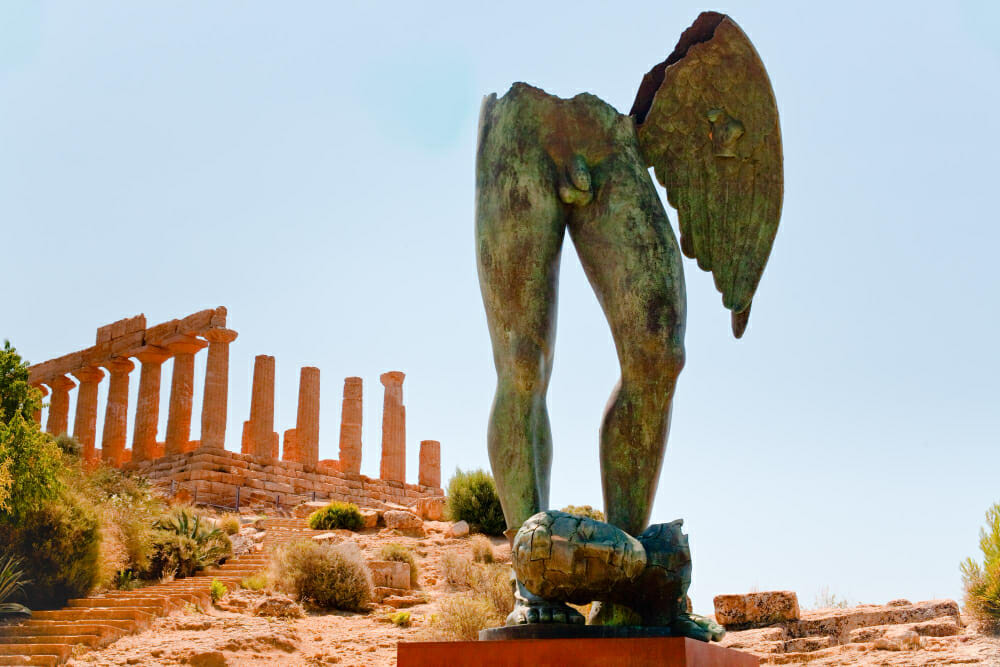The legend of Icarus, the one who flew too close to the sun

There are few who have not heard the legend of Icarus...
...the legend that stands as testimony to one of man's greatest dreams: that of flying. We have invented all kinds of flying machines that help us rise above the ground and distance ourselves at least a little from our earthly condition. From childhood dreams to flying across seas and countries in commercial aircraft, our appetite for air seems insatiable. But let's go back to ancient times, when the desire to fly was as alive as it is today.The legend of Icarus, son of Daedalus
Daedalus is presented in Greek mythology as an architect and sculptor, known especially for the construction of the famous Labyrinth in Knossos, by order of King Minos. The labyrinth housed the Minotaur - the son of the king's wife, born as a result of the revenge of the god Poseidon: "It was built of stone, it was high, but uncovered, dozens, hundreds of columns, halls and even stairs were winding in it. They all crossed, went up or down in such a way that you were confused. If you go in there, you get confused and, trying to get out, you sink worse. And no matter how hard you tried, you couldn't find your way, you couldn't get out." This is how the labyrinth is described in which Minos imprisoned the Minotaur and where he often brought him virgins and flames as a sacrifice, to appease his appetite for human flesh. After a while, Daedalus, sick of the sacrifices made for the Minotaur, conspires with Theseus to kill the monster. As punishment, Minos locks the architect and his son, Icarus, in the labyrinth and builds the exit. But the ingenious Daedalus manages to make two pairs of wax wings, for himself and his son, who should have saved them. But Icarus, fascinated by the beauty of flight and heights, gets too close to the Sun. The god Helios, mad at the fact that people have discovered the secret of flight, melts with his heat the wings of Icarus, who falls into the waters of the Aegean sea, near an island, hits some rocks and dies. The island now bears his name.
Important lessons from The Legend of Icarus:
The danger of excessive ambition: Icarus, blinded by the joy of flight and the desire to reach unsuspected heights, ignores his father's warnings and gets too close to the Sun. The wax on his wings melts, and he falls into the sea, losing his life. This story teaches us that unchecked ambition can lead to tragedy. It is important to temper our desires and be aware of the risks involved in our actions.
The importance of listening to advice: Daedalus, being wiser and more experienced, warns Icarus not to fly too high. Unable to control his curiosity and enthusiasm, Icarus ignores his father's advice, with fatal consequences. This story emphasizes the importance of listening to the advice of those more experienced and wiser than us.
Balance in everything: The legend of Icarus teaches us that balance is essential in life. Both lack of ambition and excessive ambition can be harmful. We must strive to strike a balance between our aspirations and prudence, considering the risks and consequences of our actions.
Pride and the Fall: Icarus, confident in his abilities and fascinated by the freedom of flight, gets carried away by pride. He ignores warnings and defies human limits, believing he can attain the status of gods. His tragic fall serves us as a moral tale about the danger of arrogance and the importance of modesty.
Death as a symbol of ephemerality: The legend of Icarus reminds us of the fragility of life and the ephemeral nature of human existence. The death of Icarus is a tragedy, but it also serves as a memento mori, a reminder of inevitable death.
The Importance of Learning from Mistakes: The Legend of Icarus is a timeless story that teaches us valuable lessons about life, ambition, obedience, poise, and modesty. Through the tragedy of Icarus, we are urged to learn from the mistakes of others and live our lives with prudence, wisdom and responsibility.
Cultural Significance: The legend of Icarus has had a significant impact on Western culture, being reinterpreted and represented in various forms of art, literature and music. The story of Icarus continues to inspire and provoke reflection on the human condition and the limits of ambition.
This is the Legend of Icarus - the one who scared the gods
...he becoming the symbol of the man who tries to surpass himself, but the excess of zeal, haste, and lack of experience kill his dream. The legend can also be understood as the momentum of human progress, hindered by oppressive forces. Whichever meaning we opt for, the story remains enchanting in its original, non-plasticized meaning, in which the one who lifts Icarus is the dream of freedom, held under the dreamer's so fragile wings and guarded at the cost of life.

